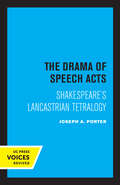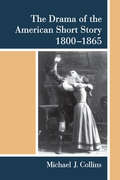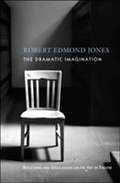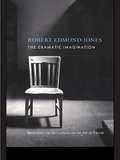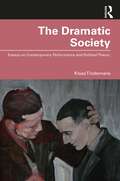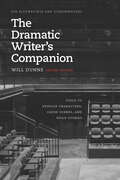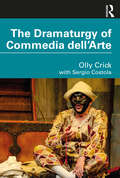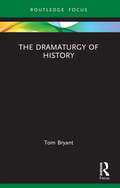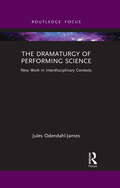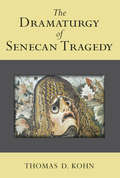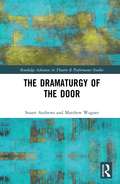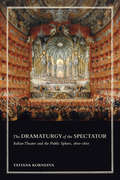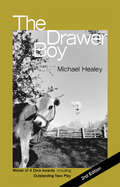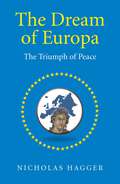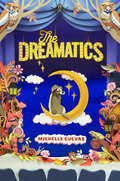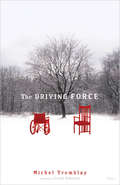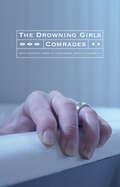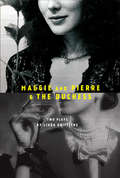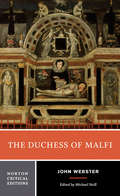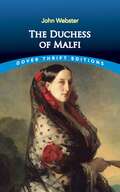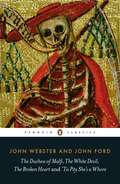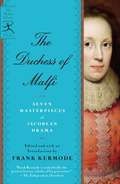- Table View
- List View
The Drama of Speech Acts: Shakespeare's Lancastrian Tetralogy
by Joseph A. PorterThis title is part of UC Press's Voices Revived program, which commemorates University of California Press’s mission to seek out and cultivate the brightest minds and give them voice, reach, and impact. Drawing on a backlist dating to 1893, Voices Revived makes high-quality, peer-reviewed scholarship accessible once again using print-on-demand technology. This title was originally published in 1979.
The Drama of the American Short Story, 1800-1865
by Michael J. CollinsThe Drama of the American Short Story, 1800-1865 argues that to truly understand the short story form, one must look at how it was shaped by the lively, chaotic, and deeply politicized world of 19th-century transatlantic theater and performance culture. By resurrecting long-neglected theatrical influences on representative works of short fiction, Michael J. Collins demonstrates that it was the unruly culture of the stage that first energized this most significant of American art forms. Whether it was Washington Irving's first job as theater critic, Melville's politically controversial love of British drama, Alcott's thwarted dreams of stage stardom, Poe and Lippard's dramatizations of peculiarly bloodthirsty fraternity hazings, or Hawthorne's fascination with automata, theater was a key imaginative site for the major pioneers of the American short story. The book shows how perspectives from theater studies, anthropology, and performance studies can enrich readings of the short-story form. Moving beyond arbitrary distinctions between performance and text, it suggests that this literature had a social life and was engaged with questions of circumatlantic and transnational culture. It suggests that the short story itself was never conceived as a nationalist literary form, but worked by mobilizing cosmopolitan connections and meanings. In so doing, the book resurrects a neglected history of American Federalism and its connections to British literary forms.
The Dramatic Imagination: Reflections and Speculations on the Art of the Theatre
by Robert Edmond JonesThe author's innovations in set design and lighting brought new ideas to the stage, but it is greater understanding of design - its role at the heart of theater - that has continued to inspire theater students.
The Dramatic Imagination: Reflections and Speculations on the Art of the Theatre, Reissue (A\theatre Arts Book Ser.)
by Robert Edmond JonesThe Dramatic Imagination is one of the few enduring works written about set design.Robert Edmond Jones's innovations in set design and lighting brought new ideas to the stage, but it is greater understanding of design - its role at the heart of theater - that has continued to inspire theater students. The volume includes "A New Kind of Drama," "To a Young Stage Designer" and six other of Jones's "reflections."
The Dramatic Society: Essays on Contemporary Performance and Political Theory
by Klaas TindemansAll societies are, by their very nature, dramatic. They present themselves, especially for those who want to look back in time, as a fascinating and confusing whole of theatrical events and constructions. Sometimes the theatre itself succeeds in capturing that fascination and confusion. This book describes the dramatic society in the form of case studies that link politics, history and culture. The Dramatic Society uses selected plays to examine specific moments in history. Its range of subjects are extremely diverse, including Medea as an icon of terrorism, a choreography based upon Shakespeare’s As You Like It, horror movies about the German unification, a truth commission dealing with "human zoos", and the reconstruction of Ai Weiwei’s troubles with the tax authorities. This collection of insightful essays deals with theatrical performances – including happenings, installations and movies – of the past fifty years, with every chapter attempting to link artistic events with politics and political theory, from Hannah Arendt to Slavoj Žižek. This is a revealing assessment of the ways in which drama and politics become intertwined, offering crucial insights for scholars and students of theatre studies, performance studies, contemporary politics and cultural studies.
The Dramatic Writer's Companion: Tools to Develop Characters, Cause Scenes, and Build Stories
by Will DunneMoss Hart once said that you never really learn how to write a play; you only learn how to write this play. Crafted with that adage in mind, The Dramatic Writer's Companion is designed to help writers explore their own ideas in order to develop the script in front of them. No ordinary guide to plotting, this handbook starts with the principle that character is key. "The character is not something added to the scene or to the story," writes author Will Dunne. "Rather, the character is the scene. The character is the story." Having spent decades working with dramatists to refine and expand their existing plays and screenplays, Dunne effortlessly blends condensed dramatic theory with specific action steps--over sixty workshop-tested exercises that can be adapted to virtually any individual writing process and dramatic script. Dunne's in-depth method is both instinctual and intellectual, allowing writers to discover new actions for their characters and new directions for their stories. Dunne's own experience is a crucial element of this guide. His plays have been selected by the Eugene O'Neill Theatre Center for three U. S. National Playwrights Conferences and have earned numerous honors, including a Charles MacArthur Fellowship, four Bay Area Theatre Critics Circle Awards, and two Drama-Logue Playwriting Awards. Thousands of individuals have already benefited from his workshops, and The Dramatic Writer's Companion promises to bring his remarkable creative method to an even wider audience.
The Dramatic Writer's Companion: Tools to Develop Characters, Cause Scenes, and Build Stories (Chicago Guides to Writing, Editing, and Publishing)
by Will DunneSpark your creativity, hone your writing, and improve your scripts with the self-contained character, scene, and story exercises found in this classic guide.Having spent decades working with dramatists to refine and expand their existing plays and screenplays, Dunne effortlessly blends condensed dramatic theory with specific action steps—over sixty workshop-tested exercises that can be adapted to virtually any individual writing process and dramatic script. Dunne’s in-depth method is both instinctual and intellectual, allowing writers to discover new actions for their characters and new directions for their stories. The exercises can be used by those just starting the writing process and by those who have scripts already in development. With each exercise rooted in real-life issues from Dunne’s workshops, readers of this companion will find the combined experiences of more than fifteen hundred workshops in a single guide.This second edition is fully aligned with a brand-new companion book, Character, Scene, and Story, which offers forty-two additional activities to help writers more fully develop their scripts. The two books include cross-references between related exercises, though each volume can also stand alone.No ordinary guide to plotting, this handbook centers on the principle that character is key. “The character is not something added to the scene or to the story,” writes Dunne. “Rather, the character is the scene. The character is the story.” With this new edition, Dunne’s remarkable creative method will continue to be the go-to source for anyone hoping to take their story to the stage.“Dunne mixes an artist’s imagination and intuition with a teacher’s knowledge of the craft of dramatic writing.” —May-Brit Akerholt, award-winning dramaturg
The Dramaturgy of Commedia dell'Arte
by Olly CrickThis book examines Commedia dell'Arte as a performative genre, and one that should be analysed through the framework of dramaturgy and dramaturgical practice. This volume examines the way Commedia has been explored in the twentieth and twenty-first centuries, and details its reinventors’ dramaturgic approaches, both focusing in on specific examples such as Jacques Lecoq, Dario Fo and Antonio Fava, and also suggesting how modern discoveries may aid the study of historical performance practice. It also discusses how audiences read and receive masks; the relationship between the different masked and unmasked roles; the range of performance activities that come under the umbrella term ‘improvisation’; the performative construction of a role performed ‘live’ from a scenario; the role of language and embodied locality in performance; and the performative relationship between performative commedia and literary tragicomedy. Its focus is dramaturgy, and so it may be read both as a text describing various theatrical practices from 1946 onwards and as a way of creating one’s own contemporary Commedia practice. It is an important read for any student or scholar of Commedia dell'Arte and theatre historians grappling with the status of this unique and influential performance form.
The Dramaturgy of History (Focus on Dramaturgy)
by Tom BryantIn this book, dramaturg Tom Bryant shares with readers and writers his insights into the process of historical adaptation. The book uses case studies from Bryant's collaborations with playwrights on successful Broadway and regional productions to work through the fundamental questions of historical adaptation: Why do you want to adapt history? For what purpose? What is your approach? How does that approach affect the portrayal of events? How does that choice by the playwright and the dramaturg then determine the framing and focus in the story, the selection of the key events and the choice of characters? What is the meaning you want the audience to take away from the events? How is your adaptation of past events relevant to contemporary times? In addition, the author explores the moral and ethical responsibilities involved for the dramaturg and the playwright in the adaptation of history and how issues of diversity, equity and inclusion impact the presentation of historical material. This is an indispensable resource for anyone whose craft brings them to the task of adapting historical material for the stage—in postgraduate work, teaching or professional practice.
The Dramaturgy of Performing Science: New Work in Interdisciplinary Contexts (ISSN)
by Jules Odendahl-JamesThis is a concise survey of new play projects that bring together the worlds of science and performance, and the benefits that dramaturgical praxis can bring to both disciplines.Three approaches common to both performance and science – collaboration, experimentation, and interpretation – are reflected in a series of case studies that demonstrate the ways in which dramaturgical tools can inform the wider public about scientific knowledge and practice, provide a truly reciprocal model of co-operation in collaboration that happens early on in the research process, and inspire the creation of new dramatic forms that enact, rather than translate, the dynamics of scientific research.Part of the Routledge Focus on Dramaturgy series, this is a vital account of collaborative work for scholars and practitioners of theatre and performance, as well as readers across the sciences.
The Dramaturgy of Senecan Tragedy
by Thomas D. KohnThe first-century Roman tragedies of Seneca, like all ancient drama, do not contain the sort of external stage directions that we are accustomed to today; nevertheless, a careful reading of the plays reveals such stage business as entrances, exits, setting, sound effects, emotions of the characters, etc. The Dramaturgy of Senecan Tragedy teases out these dramaturgical elements in Seneca's work and uses them both to aid in the interpretation of the plays and to show the playwright's artistry. Thomas D. Kohn provides a detailed overview of the corpus, laying the groundwork for appreciating Seneca's techniques in the individual dramas. Each of the chapters explores an individual tragedy in detail, discussing the dramatis personae and examining how the roles would be distributed among a limited number of actors, as well as the identity of the Chorus. The Dramaturgy of Senecan Tragedy makes a compelling argument for Seneca as an artist and a dramaturg in the true sense of the word: "a maker of drama. " Regardless of whether Seneca composed his plays for full-blown theatrical staging, a fictive theater of the mind, or something in between, Kohn demonstrates that he displays a consistency and a careful attentiveness to details of performance. While other scholars have applied this type of performance criticism to individual tragedies or scenes, this is the first comprehensive study of all the plays in twenty-five years, and the first ever to consider not just stagecraft, but also metatheatrical issues such as the significant distribution of roles among a limited number of actors, in addition to the emotional states of the characters. Scholars of classics and theater, along with those looking to stage the plays, will find much of interest in this study.
The Dramaturgy of the Door
by Stuart Andrews Matthew WagnerThe Dramaturgy of the Door examines the door as a critical but under-explored feature of theatre and performance, asking how doors function on stage, in site-specific practice and in performances of place. This first book-length study on the topic argues that doors engage in and help to shape broad phenomena of performance across key areas of critical enquiry in the field. Doors open up questions of theatrical space(s) and artistic encounters with place(s), design and architecture, bodies and movement, interior versus exterior, im/materiality, the relationship between the real and the imaginary, and processes of transformation. As doors separate places and practices, they also invite us to see connections and contradictions between each one and to consider the ways in which doors frame the world beyond the stage and between places of performance. With a wide-ranging set of examples – from Shakespeare’s Macbeth to performance installations in the Mojave desert – The Dramaturgy of the Door is aimed at performance makers and artists as well as advanced students and scholars in the fields of performance studies, cultural theory, and visual arts.
The Dramaturgy of the Spectator: Italian Theatre and the Public Sphere, 1600–1800 (Toronto Italian Studies)
by Tatiana KorneevaThe Dramaturgy of the Spectator explores how Italian theatre consciously adjusted to the emergence of a new kind of spectator who became central to society, politics, and culture in the mid-seventeenth and eighteenth centuries. The author argues that while a focus on spectatorship in isolation has value, if we are to understand the broader stakes of the relationship between the power structures and the public sphere as it was then emerging, we must trace step-by-step how spectatorship as a practice was rooted in the social and cultural politics of Italy at the time. By delineating the evolution of the Italian theatre public, as well as the dramatic innovations and communicative techniques developed in an attempt to manipulate the relationship between spectator and performance, this book pioneers a shift in our understanding of audience as both theoretical concept and historical phenomenon.
The Drawer Boy
by Michael HealeyA young actor from the big city lives with two aging bachelor farmers to gather stories about rural life. The farmers' lives are irrevocably altered when art attempts to imitate life and the line between truth and fiction is crossed.
The Dream of Emigrating at Twenty (Immigration #1)
by Ahmed SarireteAfter reaching his twentieth birthday, Mourad, a university student, never imagined that the first and riskiest decision that fate would push him to make in his new life would be to immigrate clandestinely, or as the Algerians call it "Harga". Luckily, he knew people who would help him achieve his dream without any financial compensation, but fate was against him every time he tried to accomplish his project, so he finally realized that the secret method of immigration was not designed for him, for a reason only God knows. Therefore, he decided to return home disappointed, after having left without informing his parents of his intention to emigrate. On his way back home, he was once again driven by fate to fulfill his dream of emigrating in another strange way, with a new hope and stimuli he had never imagined!
The Dream of Europa: The Triumph of Peace
by Nicholas HaggerIn The Dream of Europa, following the tradition of celebratory court masques in verse by Ben Jonson and more recently William Empson, Nicholas Hagger celebrates the court of the leaders of the European Union. Through a chorus of 50 representatives of European states he presents the growth and expansion of what became the EU in an epic sweep that takes us from 1945 to 2015 and incorporates the five elements (prologue, antimasque, masque, revels, epilogue) and blend of mythology and history found in all masques. Zeus asks Europa, the goddess of Europe, to sort out the chaos and disorder that devastated Europe in 1945. Europa presides over the growing unification of a European Union of 28 states with 22 more expected to join. Celebratory revels acclaim the Treaty of Lisbon but there is a discordant note, and Churchill has strong words for the UK representative. Finally Europa hands the EU back to Zeus. The dream of Europa is that one day the EU will turn into a United States of Europe consisting of 50 states (see front cover) like the USA, and will bring in a Universalist World State. As a court entertainment for European leaders celebrating Europe&’s progress from disorder to order, The Dream of Europa cries out to be performed in Brussels. It heralds the triumph of peace during the 70 years following 1945 and calls for a strengthening of European unity in the face of an expanding Russia that still regards Eastern Europe as being within its sphere of influence. This masque and its informative appendix on European states and rights will appeal to all generations in the 50 European states and to all beyond who value a peaceful Europe in our troubled time.
The Dreamatics
by Michelle CuevasIn this exhilaratingly original novel, a fantastical theatre and its troupe perform a young girl&’s dreams, until nightmares take over. Will one devoted stagehand be able to bring joy back into the spotlight?Have you ever awakened from a dream and thought, what was THAT?! A platypus waddling through my school while singing the word farfanoogle? Well, that dream was performed by a dream theatre, and this is the story of one such place: The Lunarian Grand.The Lunarian is a magical theatre with a mind of its own, often redecorating on a whim or making it snow from the rafters. The theatre&’s troupe call themselves the Dreamatics, and together they grow sets from seeds, sew costumes that can change an actor&’s shape, and each night when a girl named Luna goes to sleep, they produce her spectacular dreams: dreams of memories, family, and her beloved dog, Murph.But when something devastating happens in Luna&’s waking life, the theatre falls under new management in the form of the Bad Dreams. Now it&’s up to a loyal stagehand named Dormir and the Dreamatics to put things right and restore balance in their world and in Luna&’s.Go behind the scenes of your dreams in this enchanting novel full of cozy magic, humor, and wonder.
The Driving Force
by Michel Tremblay Linda GaboriauIn Act 1, Claude, 55, visits his father Alex, 77, in an Alzheimer's ward, intimately tending to his silent, vacant father's bodily needs while hopelessly trying to reach him with monologues and settle misunderstandings. In Act 2, in an eerie reversal of roles, Alex visits Claude in the same ward, similarly finding disconsolate irony where he had looked for forgiveness.
The Drowning Girls and Comrades
by Beth Graham Charlie Tomlinson Daniela VlaskalicThe Drowning Girls Bessie, Alice, and Margaret have two things in common: they are married to George Joseph Smith, and they are dead. Surfacing from the bathtubs they were drowned in, the three breathless brides gather evidence against their womanizing, murderous husband by reliving the shocking events leading up to their deaths. Reflecting on the misconceptions of love, married life, and the not-so-happily ever after, The Drowning Girls is both a breathtaking fantasia and a social critique, full of rich images, a myriad of characters, and lyrical language. Comrades Bartolomeo Vanzetti and Nicola Sacco dreamt of the land of the free. Leaving their small Italian villages, they embarked on a long voyage to the United States, only to encounter a world they never could have imagined. Controversially imprisoned for murder, both men must fight for their lives amidst discrimination and public humiliation. Based on actual events, Comrades bring to life Sacco and Vanzetti's seven-year imprisonment and explores the struggles and agonies of two men, tried not for what they did, but for who they were.
The Duchess / Maggie & Pierre: And, The Duchess
by Linda GriffithsWinner of the first Dora Mavor Moore Award for Outstanding New Play, Maggie and Pierre chronicles the public and private relationship between Pierre Trudeau and Margaret Trudeau from 1974-1980. In this mock epic tale three characters, Pierre, Margaret, and Henry, a newspaper reporter navigate the landscape of a changing nation and opposing ideals. The Duchess tells the story of Wallis Simpson, the infamous woman for whom Edward VIII abdicated his throne in 1936. Wallis was brazen and sexual, and unintentionally steered the course of British history as she captivated the king. An inspired epic, The Duchess traverses between a straightforward narrative and magic realism.
The Duchess of Malfi
by John WebsterThis Norton Critical Edition of John Webster's 1612-13 tragedy offers a newly edited and annotated text together with a full introduction and illustrative materials intended for student readers. The Duchess of Malfi's themes of love, loyalty, and betrayal have resonated through the centuries, making this a perennially popular play with audiences and readers alike. This volume includes a generous selection of supporting materials, among them Webster's likely sources for the play (William Painter, George Whetstone, Simon Goulart, and Thomas Beard) as well as related works by Webster and George Wither on widows, funerals, and memorializing death. A generous selection from Mark H. Curtis's classic essay, "The Alienated Intellectuals of Early Stuart England," tells readers as much about the character of Bosola as it does about his creator. Henry Fitzgeffrey (1617) and Horatio Busino (1618) provide early responses to the play. "Criticism" is thematically organized to provide readers with a clear sense of The Duchess of Malfi's central themes of dramaturgy; the politics of family, court, and religion; and gender. Also included are essays on contemporary re-imaginings of the play and its critical reception over time. Contributors include Don D. Moore, Inga-Stina Ewbank, Christina Luckyj, Barbara Correll, D. C. Gunby, Lee Bliss, Rowland Wymer, Brian Chalk, Theodora Jankowski, and Pascale Aebischer. A selected bibliography is also included.
The Duchess of Malfi (Dover Thrift Editions)
by John WebsterThe evils of greed and ambition overwhelm love, innocence, and the bonds of kinship in this dark tragedy, first presented circa 1613. John Webster's great Jacobean drama focuses on a secret marriage that strikes the disastrous spark to an inferno of violence. When the Duchess of Malfi marries Antonio, a household steward, her two fiendishly jealous brothers - hoping to inherit her title and estates - plant a household spy whose treachery leads to a bloody and horrifying climax. Often compared to Shakespeare in terms of his dynamic plots and poetic lyricism, Webster created radical, profoundly original works that feature shifting perspectives and thought-provoking challenges to conventional moral judgments. Required reading for courses in seventeenth-century English literature, this provocative masterpiece from the Golden Age of English drama will not only be welcomed by students and teachers of English literature but also a wide audience of general readers.
The Duchess of Malfi, The White Devil, The Broken Heart and 'Tis Pity She's a Whore
by John Webster John FordThese four plays, written during the reigns of James I and Charles I, took revenge tragedy in dark and ambiguous new directions. In The Duchess of Malfi and The White Devil, John Webster explores the role of women and the problems of power, sex and corruption in the Italian court, creating two unforgettable anti-heroines. In The Broken Heart, John Ford questions the value of emotional repression as his characters attempt to subdue their desires and hatreds in ancient Greece. Finally, Ford's masterpiece 'Tis Pity She's a Whore explores the taboo theme of incest and forbidden lust in a daring reworking of Romeo and Juliet.Jane Kingsley-Smith has edited the plays from the earliest quartos and added invaluable editorial material, including explanatory glosses and a new introduction that discusses how the playwrights explored issues around women, sex, power and violence.JOHN WEBSTER was born in about 1578 in London. He studied law at the Middle Temple before embarking on a career in the theatre, collaborating on many plays with contemporary dramatists. But it was his two solo-authored tragedies, The White Devil (1612) and The Duchess of Malfi (1614), which sealed his reputation. He died in the 1630s.JOHN FORD was born in 1586 in Devon. His early career was wholly concerned with poetry and philosophical works, and it was not until the 1620s that he began collaborating on stage plays. In the late 1620s, he began writing alone, producing the eight plays on which his reputation would be based, including The Broken Heart (1620) and 'Tis Pity She's a Whore (c.1630). Nothing more is known of Ford after the performance of his last play in 1638. JANE KINGSLEY-SMITH completed her PhD at the Shakespeare Institute, Stratford-upon-Avon and is the author of two monographs: Shakespeare's Drama of Exile (2003) and Cupid in Early Modern Literature and Culture (2010). She is a Reader at Roehampton University, London, and a regular guest speaker at Shakespeare's Globe.
The Duchess of Malfi: Seven Masterpieces of Jacobean Drama
by Frank KermodeEdited and with an Introduction by Frank Kermode. A Woman Killed with Kindness by Thomas Heywood. Volpone by Ben Jonson. The Revenger's Tragedy by Cyril Tourneur. The Maid's Tragedy by John Fletcher and Francis Beaumont. A Chaste Maid in Cheapside by Thomas Middleton. The Duchess of Malfi by John Webster. The Changeling by Thomas Middleton and William Rowley. The lyrical, bloodthirsty tragedies and witty urban comedies in this original collection were first performed during the reign of King James I (1603--25). Though nearly four centuries old, they display surprisingly modern sensibilities regarding sex, violence, morality, and honor. Brilliantly introduced and annotated by Frank Kermode, these seven Jacobean masterpieces are the finest and most representative plays of a time when drama was the most vital and important mirror of English society.
